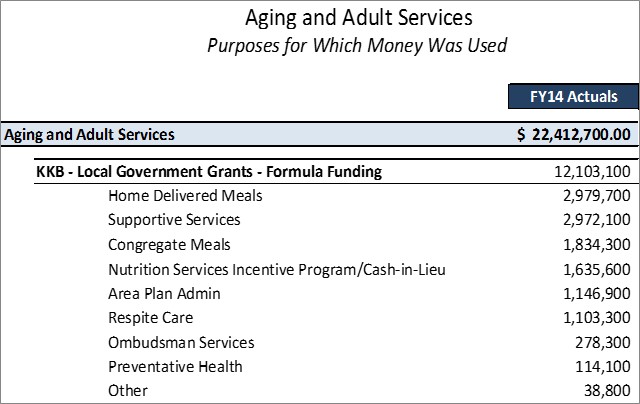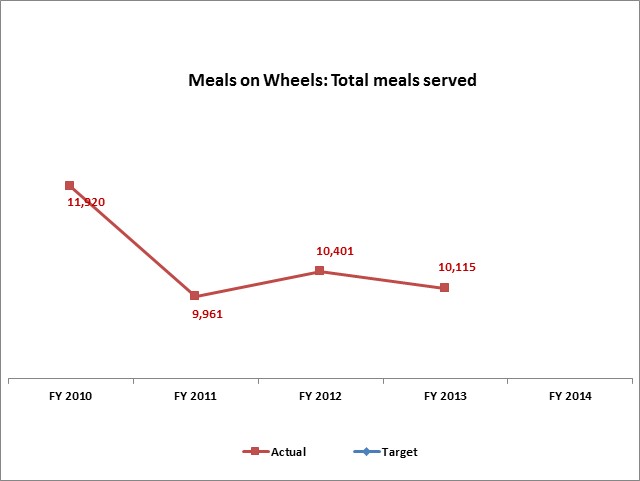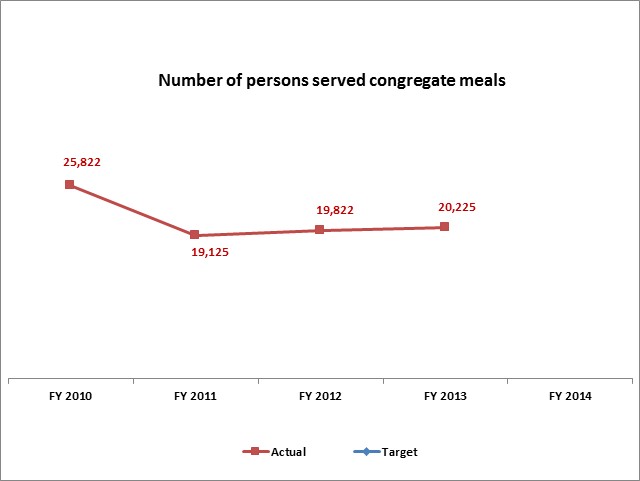Funding for programs through the Older Americans Act is distributed to Area Agencies on Aging (AAAs) through an approved funding formula.
During the 2015 General Session, the Legislature appropriated for Fiscal Year 2016, $12,999,900 from all sources for Local Government Grants - Formula Funds. This is a 4.9 percent increase from Fiscal Year 2015 revised estimated amounts from all sources. The total includes $5,394,300 from the General/Education Funds, an increase of 9.2 percent from revised Fiscal Year 2015 estimates.
In addition to statewide compensation and internal service fund cost increases, the following appropriation adjustments were made during the 2015 General Session:
For the most recent completed fiscal year, the following information represents the purposes for which the money was used:



Regarding the negative trend greater than 5% in the total meals served from the Aging Meals on Wheels program performance measures, the agency states, "The overall decrease in service units for HDM's is reflective of the decrease in local expenditures for several rural AAAs. This has resulted in funding limitations/cuts over the past three years. As a result, in FY2012, some centers reduced their days of service &/or cut services based upon prioritization of need. Local funding did increase last year for some AAAS as did state funding demonstrating a slow increase in the Meals on wheels Program, however certain AAAs remain underfunded and have closed or plan on closing senior centers in FY2014. Two of these centers are also Meals on Wheels service providers."
Regarding the negative trend greater than 5% in the total meals served from the Aging Congregate Meals program performance measures, the agency states, "The overall decrease in service units for congregate meals is reflective of the decrease in local expenditures for several rural AAAs. This has resulted in funding limitations/cuts over the past three years. As a result, in FY2012, some centers reduced their days of service &/or cut services based upon prioritization of need. Local funding did increase last year for some AAAS as did state funding demonstration a slow increase in the Meals on wheels Program, however certain AAAs remain underfunded and have closed or plan on closing senior centers in FY2014. Two of these centers are also Meals on Wheels service providers."
In Utah, there are twelve AAAs (local government units) under contract with the state division. Five counties are separate service providers (Salt Lake, Davis, Tooele, San Juan, and Uintah). One provider is a cooperative venture between Weber and Morgan counties. The other six providers are associations of county governments (AOG):
- Mountainland AOG (Utah, Summit, and Wasatch), Five County AOG (Kane, Iron, Washington, Garfield, and Beaver), Six County AOG (Juab, Millard, Sevier, Wayne, Piute, and Sanpete), Southeast AOG (Carbon, Emery, and Grand), Uintah Basin AOG (Daggett and Duchesne), and Bear River AOG (Cache, Box Elder, and Rich).
Grants are typically distributed by formulas developed by the State Board of Aging and Adult Services. Separate formulas have been developed for the distribution of: 1) the Older Americans Act, 2) General Fund appropriated for In-home Services, and 3) the Ombudsman program. Some of the services and programs operated by the AAAs are listed below.
- Support Services: This includes outreach, transportation, friendly visitor, telephone reassurance services, and other services designed to provide support to individuals in their own homes.
- Nutrition: The Area Agencies on Aging provide both group (congregate) and home-delivered meals. Recipient donations account for approximately 20 percent of the cost of a meal. Many rural communities do not have meal programs available. Most existing programs have applicant lists for home-delivered meals.
- Nutrition Services Incentive Program: During FY 2003, Congress transferred the Nutrition Services Incentive Program from the Department of Agriculture to the Administration on Aging. This grant reimburses nutrition providers for a portion of the cost of the food.
- Elder Abuse Prevention: Abuse prevention consists of a public relations campaign promoting awareness of abuse as well as the need to report abuse, neglect, and exploitation of the elderly.
- Preventive Health: Preventive Health is an outreach and educational program designed to promote healthy lifestyles among the elderly.
- Long Term Care Ombudsman: An Ombudsman program is established in UCA 62A-3-201 to assist the elderly in "asserting their civil and human rights as patients, residents, and clients of long term care facilities . . . ." There currently is staff distributed statewide throughout the AAAs to handle investigations. In addition, there are also volunteers who serve as ombudsmen.
- Caregiver Support Program: The caregiver support program is a state and federally funded program designed to provide assistance and respite to caregivers of adults suffering from long-term chronic illness. Support services aimed at reducing stress associated with care giving include counseling, training, organized support groups, respite care, and other limited supplemental services.
COBI contains unaudited data as presented to the Legislature by state agencies at the time of publication. For audited financial data see the State of Utah's Comprehensive Annual Financial Reports.